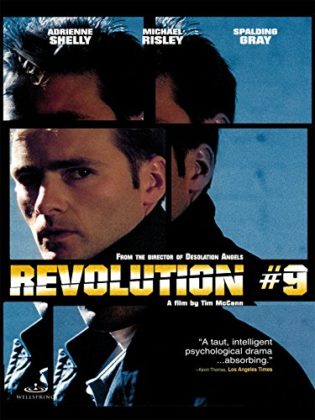 An interesting companion piece to 1993’s CLEAN, SHAVEN, this no–budgeter attempts to dramatize the inner world of a paranoid schizophrenic. It’s only partially successful, though.
An interesting companion piece to 1993’s CLEAN, SHAVEN, this no–budgeter attempts to dramatize the inner world of a paranoid schizophrenic. It’s only partially successful, though.
Writer/director Tim McCann previously impressed with his urban drama DESOLATION ANGELS (1995). Like that film, REVOLUTION #9 (2001) was shot guerilla-style in New York City for around $200 thousand. It also featured two independent movie stalwarts: actress Adrienne Shelly and monologist Spalding Gray. In a sad twist of fate, it was to be among the final credits of both, as Gray committed suicide in 2004 and Shelly was murdered in 2006.
James Jackson is a successful New York City writer suffering from paranoid delusions. This is an especially unfortunate development, as Jackson has just gotten engaged to the pretty Kim, a devoted cocktail waitress. Yet Jackson’s delusions continue unabated, to the point that he begins seeing conspiracies everywhere he looks. His work becomes affected, and he’s fired from his job.
One night Jackson happens to catch a commercial for a perfume called Rev #9, and decides the conspiracy against him stems from its images. Jackson gets in touch with the commercial’s director, a sleazy artist named Scooter—Jackson confronts Scooter at his apartment in a mock interview, but this does nothing to stem his delusions.
Jackson ends up tossed in a mental hospital. The staunchly loyal Kim does what she can, expending quite a bit of effort making over her and Jackson’s apartment in anticipation of his return. But despite the rosy front he presents to his doctors at the mental hospital, Jackson is not getting better—in actuality, his madness is steadily increasing.
The opening scenes of this film are so clichéd and amateurish one is tempted to dismiss the whole thing. The presentation of the protagonists’ “normal” life is hopelessly staid and pedestrian, and wouldn’t pass muster in a student film.
Yet Tim McCann’s direction gains confidence, particularly in the depictions of the central character’s disturbed inner world. Decked out in strobe lighting, impressionistic editing and varying sound levels, these sequences are convincing and disturbing. McCann also works up a great deal of clammy suspense in his depiction of Jackson’s attempts at tracking down whom he sees as the mastermind of his torment. The presence of Spalding Gray helps immensely—the man has real screen presence and is mighty fun to watch. The performances of Michael Risley and Adrienne Shelly are also quite fine, and McCann even gets in some pertinent real-life points about commercial saturation and how it impacts us.
Unfortunately the film loses much of its momentum in the final third, in which it switches gears from a jittery thriller to an ostensibly serious drama. Yet the nerve-jangling final scenes, intercutting some boys on the street watching Jackson’s suicide with Kim’s attempts at making their apartment right for his return, are pitch perfect. McCann clearly had the talent and intelligence to make a much better film, and with a proper budget he very well might have. But as it stands REVOLUTION #9 doesn’t quite make the cut.
Vital Statistics
REVOLUTION #9
Exile Productions
Director/Screenwriter/Cinematographer: Tim McCann
Producers: Shannon Goldman, Tim McCann, Michael Risley
Editing: Tim McCann, Shannon Goldman
Cast: Michael Risley, Adrienne Shelly, Spalding Gray, Callie Thorne, Michael Rodrick, Anthony Arkin, Sakina Jaffrey, Jase Blankfort, Kristin Griffith, Jonathan Hogan, Ted Sutton, James Burton
